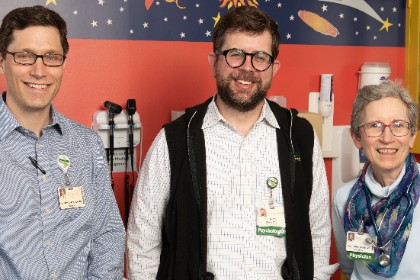April 25, 2022 by
Janet L. Essman Franz
UVM Pediatric Primary Care is removing barriers to mental health care with an evidence-based Primary Care Mental Health Integration program, piloted with support from the UVM Health Network.

(From left to right) Stan Weinberger, M.D.; Logan Hegg, Psy.D.; and Catherine Rude, M.D. (Photo: David Seaver)
When she joined UVM Children's Hospital Pediatric Primary Care practice in the 1990s, Catherine Rude, M.D., struggled to support her patients with mental health concerns. The practice did not include psychologists, psychiatrists and social workers, and connecting children to off-site specialists took great effort, Rude said.
"It was challenging to get psychiatric care for children. Wait times were extremely long and the paperwork hurdles that patients had to go through to see a mental health clinician were insurmountable for many families," said Rude, clinical associate professor of pediatrics and primary care pediatrician.
UVM Pediatric Primary Care is removing barriers to mental health care with an evidence-based Primary Care Mental Health Integration program, piloted with support from the UVM Health Network. Stan Weinberger, M.D., associate professor of pediatrics and pediatric primary care division chief, Rude, Michelle Streeter, R.N., and Logan Hegg, Psy.D, clinical assistant professor of psychiatry and pediatrics, lead the effort in partnership with Maureen Leahy, M.Ed., director of psychiatry and neurology healthcare services, UVM Medical Group, Sara Pawlowski, M.D., primary care mental health integration division chief and assistant professor of psychiatry, Clara Keegan, M.D., associate professor of family medicine, and Kerry Stanley, LICSW, lead behavioral health care manager.
This team-based approach amplifies UVM Children's Hospital's comprehensive mental health services by integrating psychology, social work and psychiatry with primary care. Within this model, primary care clinicians and mental health specialists coordinate each patient's care with in-person huddles, information-sharing and collaborative care that responds to individual patient preferences.
"The goal is to increase access in a timely and thoughtful process, providing seamless whole-person care as a team," said Hegg. "By integrating mental and behavioral health providers with complementary skills, we are building support for kids, families and pediatric clinician colleagues."
The primary care setting can make a large impact in detecting and managing mental health issues, especially among underserved populations, Hegg said. Opportunities for routine mental health screening, assessment and preventative intervention give entrée to people who traditionally lack access, including families with lower socio-economic means, New Americans and gender expansive youth. Providing youth with a place to work on mental health concerns builds on their longitudinal relationship with a primary care clinician.
Integrating mental health and primary care meets patients and providers where they are, the same day a patient presents in clinic. Struggling patients and families receive care in the exam rooms along with wellness check-ups and immunizations, decreasing stigma and disparities. Providers appreciate the responsive support.
"It's been so helpful to have a comprehensive mental health team integrated into primary care. Now these specialists are on staff in the practice and patients can make an appointment with them in the office,” said Rude.
Added Hegg, “If we can get ahead of the curve, we won't be scrambling as much with emergency department visits and crisis evaluations. It's been a real game-changer for the 7,500 kids and families who entrust us for their primary care."
The primary care mental health integration team supports training multidisciplinary providers to implement and expand this model of care, developing clinicians who appreciate medical-psychiatric comorbidity and the importance of team-based care in a primary care medical home. While the pilot rolled out in a few primary care clinics, increased mental health care staffing will spread across all 37 UVM Medical Center primary care sites over the next few years.
"Our plan is to bring this model to all UVM Health Network primary care clinics," said Hegg. "We want this to be the standard to how primary care is delivered in our region."